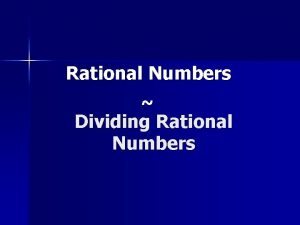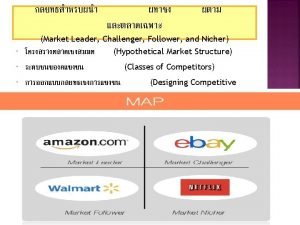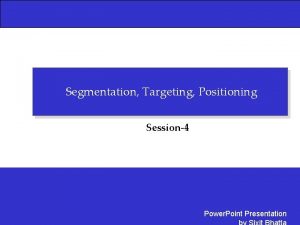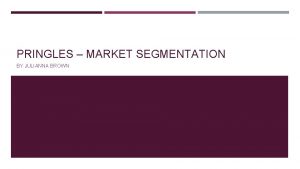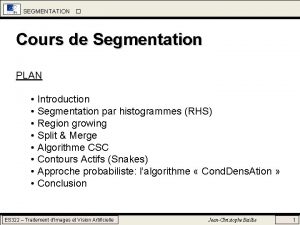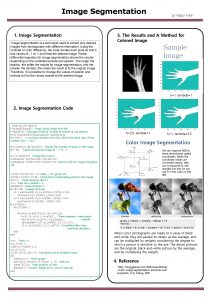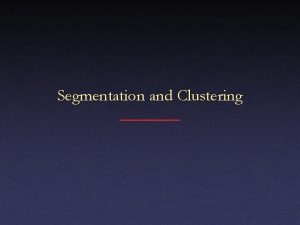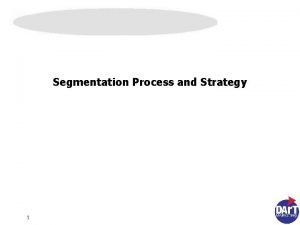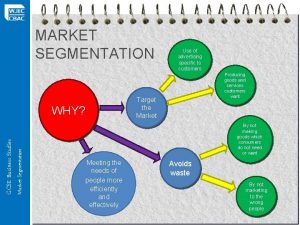Market Segmentation The Process of dividing the market























- Slides: 23

Market Segmentation The Process of dividing the market into meaningful and similar groups based needs, characteristics or behaviour

Customer vs Consumer customer • Person who buys the product consumer • Person who consumes/uses the product Sometimes they are the same person, sometimes not.

The 4 Ps/Marketing Mix and Market Segmentation Product • What is the product and who’s needs/wants does it meet? How does it meet those needs/wants? Price • how much are different market segments willing to pay? Is it different for different segments? ? Place (distribution) • Where are the market segment(s) you want to target? Where do they shop? How do they shop? Where are they geographically? Promotions • How will you reach your target market segment(s)? How will they know about your product? What types of promotion will different segments identify with/react to?

Market • all potential customers who share needs and wants, and who have the ability and willingness to buy the product

Segmenting Your Market • Sorting potential buyers into groups with common needs • Groups of buyers will respond similarly to your marketing actions • Market segment – the groups resulting from sorting/segmenting • Target market – the market segment(s) you want to focus your marketing actions on

How do we group them? Segment Market Based On: • Demographics • Psychographics • Geographics • Put another way, we use [these above] to describe different segments of the market

Example: Apple i. Phone 5 s/c Market segments: • Adults who are working full-time – Paid for by work OR mid- to upper-income – Communicate with colleagues, friends, family – Tool for improving work/home efficiency • Students – High school, college, university – Communicate with friends and family – Need portable, multi-functional device

Target Marketing • Evaluate each market segment’s attractiveness (profitability) • Focus marketing decisions on one (or more) segment of the market

Gender Demographics Ethnic background Statistical data that describes a population in terms of personal characteristics: Income Age

Demographics Education Marital Status Home Ownership

Generational Cohorts • Group of people bound together by the sharing of the experience of common historical events

Cohort: Baby Boomers • • Born 1946 -64 (post WWII) Associated with wealth/privilege Active, physically fit Size: 9. 6 m in Canada; 76 m in US

Cohort: Gen X • Born 1965 -80 • Greater diversity: race, class, religion, ethnicity, and sexual orientation • Agents of change, strong belief in individual freedom, tolerance, and human rights for all • Size: 7 m in Canada; 61 m in US

Cohort: Millenials • Born 1981 -2000 • Digital natives; trophy kids; boomerang generation • “Me” Generation; narcissistic; sense of entitlement; reject social conventions • Size: 9 m in Canada; 85 m in US

Other Demographic Descriptors • Yuppies – Young Upwardlymobile Professionals – 20 s or early 30 s; middle to upper class • DINKS – Dual Income, No Kids • DEWKS – Dually Employed with Kids • HENRYs – High Earners, Not Rich Yet

Psychographics Segmentation of a market based on peoples’: • Lifestyles; attitudes; values; behaviours • Don’t confuse with DEMOGRAPHICS

Geographics • segmentation of a market based on where people live • City, region, province/state, country, international trading areas, etc. • Rural, urban, suburban

Customer Profile • includes information about the target market with regard to: • Demographics • Psychographics • Geographics • Does involve stereotyping and making judgements

Examples of Customer Profiles


#1 - Customer Profile Activity • Make a customer profile for 3 of these people

Sample Customer Profile • Demographics: – Gender: Male – Age: 35 -50 years old – Income: $60, 000 -$80, 000 per year – Marital Status: single – Level of Education: vocational/skilled trade – Home Ownership: owns condominium – Transportation: owns truck • Psychographics: very eco-conscious, traditional values, strong work ethic • Geographics: North American, urban,

#2 - Activity 1. Think of an existing product and then think of the market for this product. 2. Briefly describe the marketing mix for the product. 3. Look at the entire market and try to segment the product’s market into 2 different segments. 4. Analyze the attractiveness of each segment Example: look at each segment and think about: Which segment would buy more of the product Which segment would pay more for the product Which segment would have more money to spend on the product 5. Compare the two segments based on your analysis 6. Select the segment that you wish to target and explain/summarize why 7. Write up as a report with headings, double spaced.
 Market coverage strategy
Market coverage strategy Market segmentation is the process of dividing
Market segmentation is the process of dividing Marketing targeting and positioning
Marketing targeting and positioning How is dividing rational numbers like dividing integers
How is dividing rational numbers like dividing integers Steps in market segmentation
Steps in market segmentation التجزئة الجغرافية
التجزئة الجغرافية Hypothetical market structure
Hypothetical market structure Market segmentation images
Market segmentation images Market segmentation template
Market segmentation template Kfc segmentation targeting positioning
Kfc segmentation targeting positioning Bases of market segmentation
Bases of market segmentation Nivea positioning statement
Nivea positioning statement Explain the requisites of sound market segmentation
Explain the requisites of sound market segmentation Pringles market segmentation
Pringles market segmentation Bases of market segmentation
Bases of market segmentation Health insurance market segmentation
Health insurance market segmentation Demographic psychographic geographic
Demographic psychographic geographic Fine grained screening
Fine grained screening Nike segmentation
Nike segmentation What is global market segmentation
What is global market segmentation Beachhead market definition
Beachhead market definition Customer classification matrix
Customer classification matrix Segmenting and targeting
Segmenting and targeting Segment attractiveness matrix
Segment attractiveness matrix



